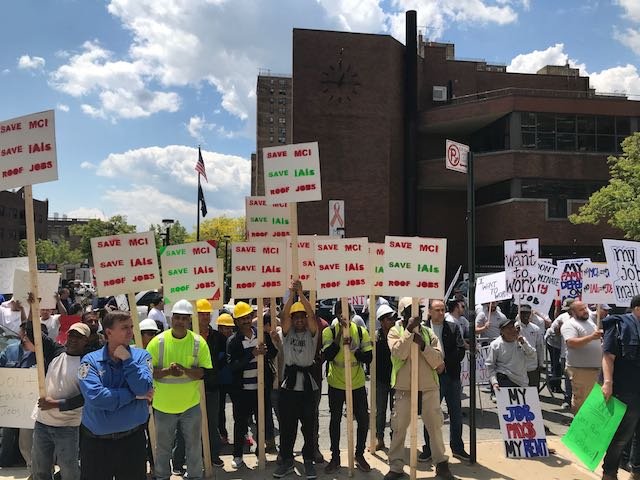As Promised, Landlord Groups Sue To Overturn New Rent Laws
July 16, 2019, 12:49 p.m.
In what was an expected challenge to the new rent laws, two landlord groups have filed a lawsuit in federal court which argues that the regulations are unconstitutional because they infringe on their property rights.

Contractors showed up to protest a hearing in May on rent reform at Medger Evers College.
In what was an expected challenge to the new rent laws, two landlord groups have filed a lawsuit in federal court which argues that the regulations are unconstitutional because they infringe on their property rights.
In June, the state passed a slate of rent reforms that added tenant protections and restricted the ways that landlords could impose rent hikes on rent-regulated apartments. The 125-page complaint, which was filed Monday evening in the U.S. District Court for the Eastern District of New York, asserts that those statutes amount to a “web of restrictions” that “override core rights of property owners and impose unconstitutional burdens on property owners of pre-1974 buildings with six or more units.”
The Rent Stabilization Association and the Community Housing Improvement Program, in addition to seven individual landlords, brought the suit against the city’s Rent Guidelines Board and the state Homes and Community Renewal Commissioner RuthAnne Visnauskas. The lawsuit did not name the state legislature or Governor Andrew Cuomo.
Many of the arguments in the lawsuit echoed those made by the real estate industry in recent months as it lobbied against rent reform. In addition to claiming that landlords will be negatively impacted, the complaint says that the new laws "exacerbate New York’s housing shortage" by preventing buildings from being redeveloped to their full zoning capacity, make market-rate apartments more expensive, and allow wealthy New Yorkers to benefit unfairly from rent stabilization.
The suit further states that the regulations deter property owners from making renovations, and as a result "will leave tens of thousands of apartments frozen in the past, with plumbing and wiring that is lawful but does not comply with current code requirements" as well as hurt the employment of contractors. The latter turned out to lobby state legislators in the waning weeks before the new laws were decided.
Reached for comment, Cea Weaver, a tenants campaign coordinator who represents the Upstate Downstate Housing Alliance, issued the following statement:
“From a threatening a strike on repairs to a frivolous lawsuit, landlords are doing whatever they can to weaken our hard-fought-for rights. But the tenant movement is stronger than its ever been. These tactics are both laughable and despicable, and the behavior of a corporate industry that is grappling with the fact that basing your business model in speculation and displacement is no longer standing operating procedure in New York.”
The lawsuit came as little surprise to tenant activists. Landlord groups announced they would sue immediately following the new legislation. Legal experts, however, have noted that the argument that rent laws unconstitutionally infringe on property rights has repeatedly failed in state and federal courts.
In 1988, the U.S. Supreme Court ruled in a case involving the city of San Jose that rent control was not unconstitutional, and the decision has been frequently cited in subsequent court decisions.
“It’s a very, very well established body of law at this point,” Ed Josephson, director of litigation and housing at Legal Services NYC told Gothamist recently.